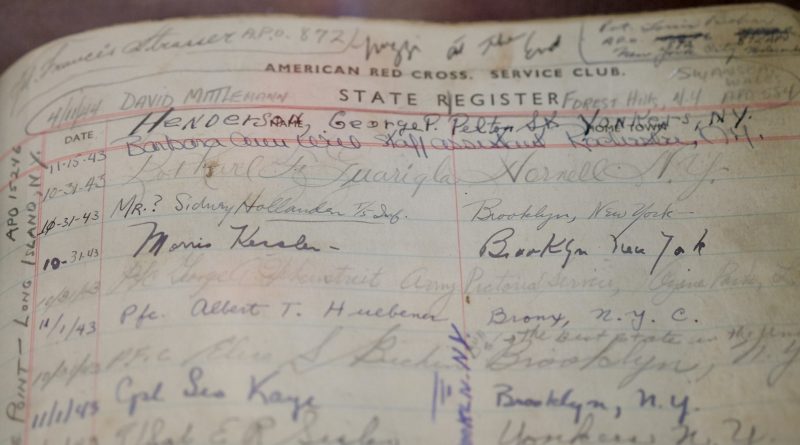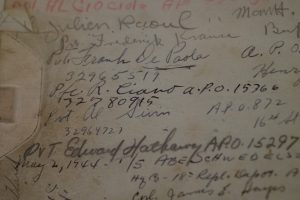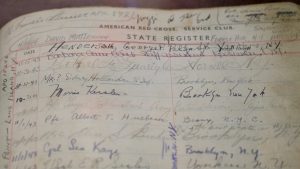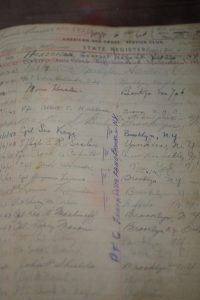US Red Cross Service Club State Record Book
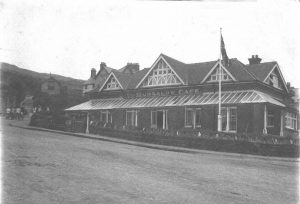 “One way the American Red Cross won the hearts of the America’s fighting men during World War II was through their stomachs. Of all the services that the Red Cross provided the armed forces, the operation of canteens at home, clubs and clubmobiles overseas remains among the most memorable in the minds of the American World War II veterans. At a canteen or club, a solider or sailor could pause for a cup of coffee, a doughnut, and bit of friendly conversation that offered him a familiar and reassuring connection with home. It also provided the Red Cross workers and volunteers the opportunity to be of service to their country and to lift their own spirits as they made a personal contribution to the war effort.
“One way the American Red Cross won the hearts of the America’s fighting men during World War II was through their stomachs. Of all the services that the Red Cross provided the armed forces, the operation of canteens at home, clubs and clubmobiles overseas remains among the most memorable in the minds of the American World War II veterans. At a canteen or club, a solider or sailor could pause for a cup of coffee, a doughnut, and bit of friendly conversation that offered him a familiar and reassuring connection with home. It also provided the Red Cross workers and volunteers the opportunity to be of service to their country and to lift their own spirits as they made a personal contribution to the war effort.
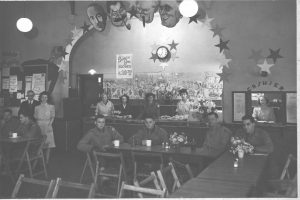 Another branch of the American Red Cross, Service to the Armed Forces (SAF), operated a Club Service which provided refreshements, accommodation, and comfort and recreational activities wherever American troops were located overseas. The Red Cross staffed and supplied permanent service clubs, travelling clubmobiles , and other recreational facilities that stretched literally around the world. At its peak, the Red Cross, operated nearly 2,000 such facilities aborad, staffed by 5,000 Red Cross workers and approximately 140,00 mostly local volunteers.
Another branch of the American Red Cross, Service to the Armed Forces (SAF), operated a Club Service which provided refreshements, accommodation, and comfort and recreational activities wherever American troops were located overseas. The Red Cross staffed and supplied permanent service clubs, travelling clubmobiles , and other recreational facilities that stretched literally around the world. At its peak, the Red Cross, operated nearly 2,000 such facilities aborad, staffed by 5,000 Red Cross workers and approximately 140,00 mostly local volunteers.
These facilites had different looks depending on their locale and the services they offered. Some consisted of only a few tables placed in a temporary outdoor setting, stacked with trays of sandwiches and doughnuts, hot cups of coffee, and maybe a large ‘soda pop’ cooler. More permanent service clubs ranged from large facilities in major cities, often former hotels, to small facilities in towns and villages in both European and Pacific theaters of war. The large clubs offered not only means and recreational activities but also overnight accommodation and such amenities as barber shops and laundries. Some also provided opportunities for sightseeing, taking tours of museums, castles and cathedrals, and attending shows at local theatres and movie houses. Smaller clubs, usually located in outlying areas close to American facilities. Many were called Donut Dugouts.
The record book that we have at Mortehoe Museum, was from such a club, sited in what at the time was called the ‘Bungalow Café; and today better known as the ‘Red Barn’. It contains the signatures of those US Armed Forces Personnel who were in the area, and visited the club signing the record book.
